Erstellt am: 29. 6. 2013 - 12:28 Uhr
Croatia: "No Euphoria, Just Realism"
In the grandiose tree-lined park that stretches out from Zagreb`s central train station, workers in green-overalls were toiling with spades to prettify the city.
New shiny white gravel was being spread on the paths and gardeners were bending low to remove weeds from the flower beds in front of the statue of Croatia`s unifying king Tomislav, one of those saber wielding monarchs looking defiant atop his big metal horse.
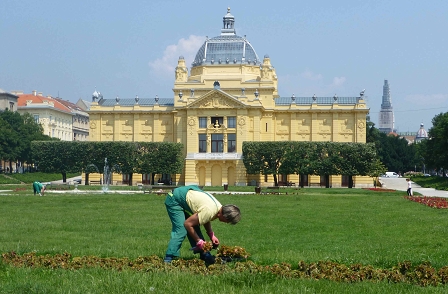
chris cummins
Another more peaceful and more bureaucratic unifying moment lies ahead for Croatia this weekend. It`s another key moment in Croatia`s turbulent political history.
On the 1st of July, the country becomes the 28th member of the European Union. When the heads of state arrive to enjoy the accession party on the night of the 30th of June, the authorities clearly want Zagreb to look sparkling.
"It`s going to be fun," beamed Ana Burica, a 23 year old economics student at Zagreb University, "Everyone`s eyes will be on Croatia."
Ana, who will finish her studies this September, is also young entrepreneur with a start-up company that designs apps for medical use. Wearing a smart suit-jacket and sipping water in the lobby of a luxury inner city hotel, she seems a poster child of a young, ambitious, hi-tech and striving Croatia.
Dieses Element ist nicht mehr verfügbar
Not surprisingly, Ana is in favour of accession. That`s partly because of the sales benefits for her young company offered by the common market of 500 million consumers. But it`s also because she feels that Croatia has a lot to bring to the party. Croatians have proved successful entrepreneurs even in the lean years of the two decades since the break up of Yugoslavia, she told me, and will bring a new creative impulse to the European community:
"We are used to making a lot out of little".
It is perhaps the sort of optimistic get-up-and-go attitude from which the self-critical and mutually resenting member estates could benefit.
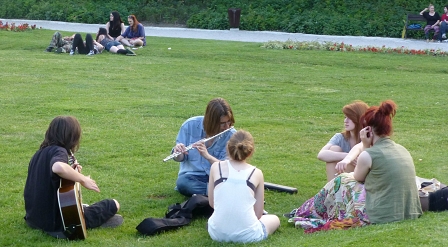
chris cummins
Yet not everyone I met in Zagreb shared Ana`s enthusiasm. As the sun went down and a hot day slipped into a balmy summer evening, the newly clipped grass of the Tomislav park had become an extended living room for Zagreb`s youth.
They sat in huddles and passing around two litre plastic bottles of beer or cheap Dalmatian wine mixed into water bottles and the prevailing mood was one of apathy.
Irene and Vladka, a duo of professional artists, were focussing on the practicalities: "I think most people are just thinking about how it will be more easy to travel and cross borders," Irene told me, "but other than that, we are not really interested in politics. It is not important to us."
Dieses Element ist nicht mehr verfügbar
Vladka smiled and agreed, adding that if she dwelled too much on politics it "might make her head explode," but as an artist, she hoped it would open access to a bigger creative scene.
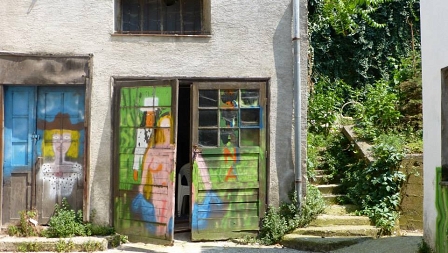
chris cummins
I moved on and met a student called Irma, who was gently strumming a guitar in the park. She was also restrained in her optimism: "I actually think things are going to improve. We are going to have better opportunities for work although I doubt anything will significantly change." She paused, strummed, and added: "Our government will still be shitty, of course."
Irma`s friend Darko said it was hard to work out what membership would really mean: "Nobody knows what the new obligations will be."
More Problems Than Promises
The perceptions of the European Union have changed since the financial crisis hit the continent.
"People are more realistic. They know they are not going to get the goodies were promised to them before," said Slavenka Drakulic, the Croatian author of Balkan Express and Café Europa. "The biggest fear is that it is not going to improve the unemployment situation which is currently at 20 percent. Jobs are crucial, especially for young people."
In the news you hear more about the problems than the promise of the EU nowadays. "A lot of people are afraid that the Greece scenario might happen here," admitted Ana Burica. "The truth is that there are a lot of unemployed people who fear foreigners will come and live in Croatia and take their jobs but it is not that simple, and I think that they will relax when they see that doesn`t happen." There is a particular worry that when membership means that Croatia`s long Adriatic coastline becomes the gateway to the EU there will be floods of economic migrants from Africa.
Perhaps emigration rather than immigration is the more potent threat. Will EU membership lead to a brain drain?
Ana Burica hopes not. Croatia is promised nearly 2 billion euros a year in European development aid in the immediate future and she hopes that the country can make the most out this EU funding so that most Croatians will want to stay and help drive the country on. "We are very proud people," she told me.
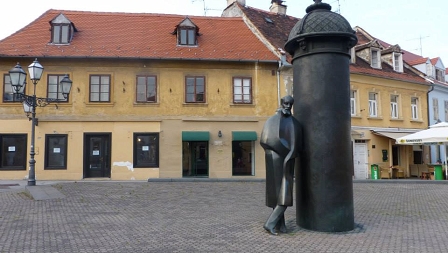
chris cummins
That sense of pride was palpable everywhere in Zagreb and was a cause of some students’ distrust of the implications of accession. "I think it is bad for us to have the European Union. We fought for our independence against Serbia," said Ilia, who can`t have been more than an infant when the wars of the 1990s ended. "Now we want to join another union for some sort of help. But we don`t need help. We have clean water and we have great resources. We are looking for help that we don`t need. I`m not a conservative but I don`t feel we need the EU if we stand work together as Croatians."
Not Enough Time To Breathe
For some, Croatia, which was swallowed up by empires and federations for almost its entire history, hasn`t had long enough to go it entirely alone." Croatia enjoyed only around 20 years of political independence," said Slavenka Drakulic, "So for us to renounce political sovereignty is a big thing."
That is an eminently understandable sentiment, particularly as young Croatians view the effects of Brussels-backed austerity measures 'forced' on EU member-states like Greece and Portugal.
"But on the other hand," noted Drakulic, "it is very difficult for a small country of 4.5 million inhabitants to survive in a competitive world. What are we going to offer apart from the sea on the beautiful Adriatic?" Tourism still dominates the Croatian economy.
In the past, particularly under its first President Franjo Tudjman, a healthy pride in independence had tipped over into what many European analysts considered crippling nationalism. In 2013 is this fading?
Young entrepreneur Ana Burica had earlier told me she was tired of this talk of the war and the remnants of nationalism that dominated politics only a decade ago. She`d briefly studied in Vienna where she had friends and colleagues from Serbia and Bosnia, "We could talk about the war without fighting and we could find something in common, because, after all, the mind-set was similar."
A Thorny Issue
For many people in Croatia, however, the legacy of the war still remains. Croats still tend to see Ante Gotovina, who fought the Serb forces that once shelled Zagreb, as a hero. In 2011 he was convicted of war crimes at UN tribunal in The Hague, but that verdict was overturned 19 months later. He remains a much revered figure in Zagreb - even if he is controversial and divisive elsewhere and particularly over the border in Serbia. "I don`t think that will change," one young Zagreb student told me.
Three months ago a European Commission report praised Croatia`s cooperation with the war crimes tribunal in The Hague but Drakulic told me more honesty was still needed:
"It is crucial we come to terms with our past," she said. "We need to look at our own responsibility in this war. We also need to find a minimum consensus with our neighbours otherwise we will always have problems. We are still not teaching our kids the truth at school."
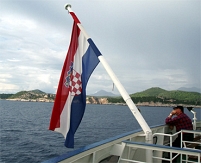
chris cummins
Perhaps the chaos of the 1990s plays a role in the sense of insecurity about identity I sensed while talking to students in the park:
"E.U. membership won`t change anything," snorted Josip. Sporting long hair and John Lennon glasses, he told me (in expletive-filled vitriol) that Croatia has never been respected internationally: "We will be in the union but still everyone will look down on us as always like we are just a bunch of crazy retards from the Balkans. They have thought the same about us for 30 years."
That`s just one opinion but it was a sentiment I have heard before in Croatia: a sense of resentment at a perceived disrespect for this proud country.
Before coming to Zagreb I’d been warned by Croatian friends not to offend people by referring to the country as part of the Balkans.
Ana explained this sensitivity. "We feel that the Balkans has a negative connotation and we like to see ourselves as regional leaders, which I believe we are." She fears that internationally a bunch of stereotypes have grown up around the Balkans including "rudeness" and "backwardness", the scars of the chaos of the 1990s.
"Cultural Hang-ups"
In Croatian author Robert Perisic`s brilliant Zagreb-set book, Our Man In Iraq, which is basically a satire of the media scene in a rapidly transforming country, the narrator explains this mentality of his country sitting "on the slippery edge of the Balkans" not wanting to exhibit too much emotion for fear of being seen as a pre-modern redneck:
"That was one of the codes of Zagreb society. We were pretty disciplined about that. I guess we felt that distinguished us from the hoi palloi of the Balkans. That makes them think we are cold and aloof but let them… My brain was doing a million rpm and I deep-scanned those Croatian cultural hang-ups. No, we mustn`t fall below certain standards, I thought. Otherwise we`d be no better than the Balkans."
There are other problems too. A recent survey on corporate graft from Ernst and Young called Croatia one of the most corrupt countries in Europe. It has to be said that the authorities have been rigorous in their efforts to tackle to problem in recent years, passing new anti-graft laws and even jailing former Prime Minister Ivo Sanader for accepting bribes, but Drakuclic told me the culture is engrained:
"It`s a system. It´s the ruling system. This is how people think, how they feel, how they behave. And that is very difficult to erradicate."
Dieses Element ist nicht mehr verfügbar
"A New Book"
You could see EU membership as marking a new beginning for Croatia, a way to distance itself from its recent past. Ana Boricic told me that accession didn`t just "mark a new page in the book, it is a whole new book."
This is a chance to cease being seen as "former Yugoslavia" but rather "new Europe". Burica feels that membership will increase the prestige of her company: "We have experienced what it means not to be in the EU, what it means when you say you are from Croatia. It is a benefit."
She said doors have closed on Croatian companies trying to find new business partners in the USA, for example, but with the European Union on calling card, she hopes the reception will be different.
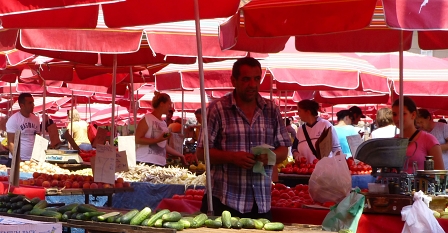
chris cummins
Having spoken to the 'bright young things' I was keen to know what other sections of society thought, so I attempted to canvas opinion at the Dolac fruit market, a colourful warren lined shiny peppers and pulpy tomatoes. But, partly due to the language barrier, I had limited success. One trader told me he hoped that membership would mean "more fair pensions" but most just shrugged or waved away my microphone.
There were also misconceptions about what was going to change on July 1st. Mohammed, who sold me some juicy Macedonian peaches, thought people would be paying in Euros from next month and wondered how that would affect his profits.
Dieses Element ist nicht mehr verfügbar
"I`m a bit worried because I don`t think the general population got enough information about what is about to change," admitted Jana, a pro E.U. student. "There is a confusion about what lays ahead. A lot of older people have approached and asked about visas or health insurance and also about the Euro. We should have been told exactly what will happen on a point by point basis."
She thinks some people will be shocked by any changes and others, who expected the EU to wave a magic wand of wealth, will be disappointed that many things will stay the same." But she says that the 7 years of negotiation, which, among other things, forced Croatia to seriously tackle corruption, have already helped.
Dieses Element ist nicht mehr verfügbar
On the massive Ban Jelačić Square there was a big tent advertising EU support for non-governmental organisations, targeting young people and explaining how they can get involved into new opportunities.
One of the volunteers of the initiative, Dubrovka, explained it was designed "to bring the EU closer to them," but she looked crest-fallen when I approached to look around. "It is for young people but there are not a lot of young people here." She believes membership will bring plenty of opportunities for young people, including the opportunity to travel more freely and to study abroad. "But we are too passive. We don`t want to find out."
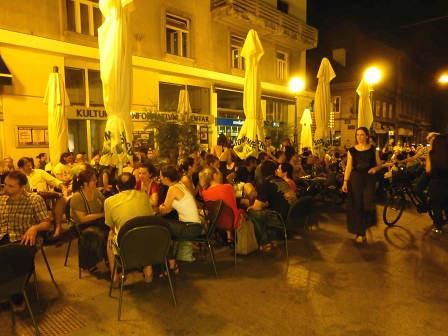
chris cummins
Perhaps the most telling statistic is that when elections in April to choose Croatia's first European Parliament deputies only 21 percent of the population turned up to vote. Suffering 20 percent unemployment, the country joins the EU more in hope than expectation. For the business elite, it is an exciting time, but for much of the population you get the feeling it is the least worst option.
The last new EU member for the foreseeable future is approaching its big party with a collective shrug of the shoulder.


